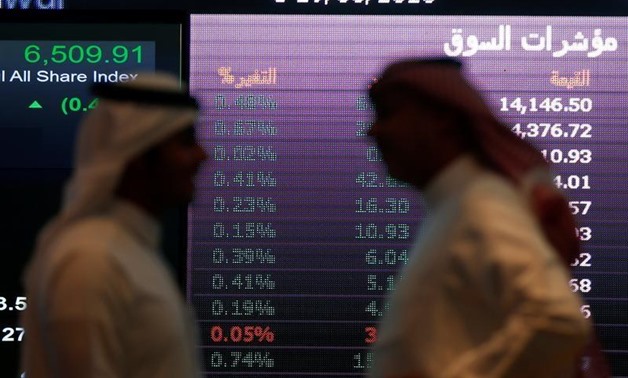
Investors talk with each other as they monitor a screen displaying stock information at the Saudi Stock Exchange (Tadawul) in Riyadh, Saudi Arabia June 29, 2016 - REUTERS/Faisal Al Nasser
DUBAI - 7 November 2017: Wealthy Saudi Arabian individual investors dumped stocks on Tuesday as jitters over the kingdom’s anti-corruption probe spread through the Gulf, pushing down every major market.
The Saudi stock index sank 0.7 percent in heavy trade, led by shares in companies linked to people detained in the investigation, which has implicated dozens of members of the political and business elite.
The market, which was down 3.1 percent at one stage, would have finished much lower than it did without apparent buying by government-linked funds seeking to prevent a panic, fund managers said.
“There was heavy selling by high net worth individuals who want to take their money out,” said one manager.
The anti-corruption probe has alarmed the business community by threatening to dismantle long-standing networks of patronage in the economy. Many investors fear people caught in the purge could eventually be forced to sell off large equity holdings.
Over a thousand Saudi bank accounts have been frozen in the investigation so far, bankers told Reuters, raising concern that companies already coping with a recession could be hurt further by delayed payments.
Shares in Kingdom Holding, the investment vehicle of Prince Alwaleed bin Talal, one of the most prominent businessmen detained in the crackdown, plunged their 10 percent daily limit on Tuesday, bringing their losses in the three days since the probe was announced to 21 percent.
The fall has wiped about $2 billion off Prince Alwaleed’s fortune, previously estimated by Forbes magazine at $17 billion.
Al Tayyar Travel, whose founder Nasser bin Aqeel al-Tayyar was detained, sank 10 percent for a second day. The company said it was operating normally and had the support of the government, but the slide in its shares suggests investors feel its fate is bound up with that of its founder.
Dallah Healthcare fell 2.0 percent after its controlling shareholder, billionaire Saleh Kamel, was held. Housing builder Red Sea International dropped 9.7 percent after chairman Amr al-Dabbagh was detained.
A mass pull-out of foreign funds from the Saudi market did not appear to be underway on Tuesday. Many foreign fund managers said that while the crackdown on corruption carried economic and political risks, it could well be positive for the kingdom’s economic reforms in the long run.
“Valuations in Saudi Arabia are more attractive today than I have seen them in a while – trading at a discount to emerging markets, which is unusual for this country, of 14.7 times trailing price to earnings,” said Asha Mehta, portfolio manager at Acadian Asset Management.
But declining stocks outnumbered gainers by 150 to 32 - even though Brent oil jumped to a more than two-year high of $64.44 a barrel overnight, an event that would normally have delighted Saudi investors.
In the previous two days, many banks and other blue chips stayed firm, but almost all sectors were caught in the sell-off on Tuesday. Saudi Investment Bank, a government-linked company, was the top performer, rising 2.4 percent.
Saudis have been significant investors in equity and real estate markets across the Gulf Arab region, so the markets reacted with dismay to the possibility that the crackdown could shrink or even reverse this flow of money, if Saudi authorities carry out their threat to seize illicit assets held abroad.
Saudis are estimated to own several percent of some Gulf stock markets, and traded 12.5 billion riyals ($3.4 billion) of Dubai property in the 18 months through June, according to official Dubai data.
In Dubai, the stock index slipped 1.8 percent to 3,481 points, triggering a triple top - a classic bearish technical pattern - formed by the highs and lows since August and pointing down below 3,450 points.
Blue chip Emaar Properties dropped 1.1 percent and DAMAC Properties tumbled 6.0 percent.
The index in Abu Dhabi, less exposed to Saudi money, fell only 0.4 percent. But Kuwait continued to slide, with its index losing 2.8 percent. National Bank of Kuwait , which had tumbled 4.5 percent on Monday, lost a further 2.8 percent and logistics blue chip Agility sank 4.4 percent.


Comments
Leave a Comment